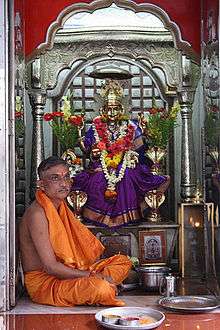Shantadurga
| Shantadurga | |
|---|---|
 Shantadurga in the Shitaladevi temple complex in Mumbai | |
| Devanagari | शांतादुर्गा |
| Sanskrit transliteration | Śāntādurgā |
| Mount | Lion |
Shantadurga (Devanagari:शांतादुर्गा, Śāntādurgā) is the most popular form of the Hindu goddess Durga revered in Goa, India. She is a Brahminical form of the ancient Mother goddess known as Santeri.[1] She is worshipped in almost all villages of Goa as an ant-hill. This is seen in some temples dedicated to Shantadurga.[2]
Origins
The second chapter of the Sanskrit Nāgavya Mahātmya, Śāntādurgā prādurbhāvaḥ, is claimed to be a part of Sahyādrikhaṇḍa which is a later inclusion in the original the Skanda Purana.[3] Only the title of the chapter mentions the goddess Shantadurga and no where else is this epithet of the goddess mentioned. This section refers to a certain sage Śāntāmuni, a resident of Nagavya (modern Nagoa). The goddess appeared before Shantamuni and hence she may have been called Shantadurga. No other justification has been furnished in this chapter. Durga is portrayed in her ferocious nature; therefore the adjective Shanta ("peaceful") is contradictory to the nature of Durga. Only in verses 16,19,34 of Sahyadrikhanda, the goddess is called Śāntādevi (Shanta-devi). The verse 18 of this section mentions about the disappearance of the goddess into ant-hill.[4] These ant-hills symbolically represent goddess Shantadurga as well as goddess Santeri. The worship of ant-hills may have originated among aboriginal tribes of Konkan and they may have associated ant-hills with goddess Santeri. Therefore, the Sahyadrikhanda furnishes the evidence of Sanskritisation of the folk deity, by the upper castes who followed Vedic, Puranic and Tantric religions, and adopted the deities of the primitive settlers of Konkan by introducing Brahminical form of worship and Sanskrit names.[1] With the advent of Tantrism, many folk-deities were absorbed into Brahminical fold. In due course, these goddesses were associated with the god Shiva.[5]
According to another myth, once there was a terrible war between the gods Shiva and Vishnu due to which the entire world was distressed. Hence the god Brahma prayed and implored Shakti (the Divine Mother) to intervene and stop the war. The Goddess held Shiva by one hand and Vishnu by the other hand and brought about reconciliation among them. This stopped the war and brought peace to the world. Such an idol of goddess is found in the inner sanctum of Shanta Durga Temple of Kavale. This legend is not mentioned any Puranas, nor such type of idol is found elsewhere in India.[6] The 17th-century Marathi Koṅkaṇa Mahātmya furnishes an exhaustive account of the conflict between the followers of the Vaisnavism (sect of Vishnu worshippers) and Shaivism (Shiva followers) in Goa. It is quite possible that the myth of Shantadurga is symbolically related to these sectarian conflicts.[1]
Iconography
Though in few shrines dedicated to Shantadurga, an ant-hill is found inside the sanctum in place a stone, metal image of the deity or a Kalasha is consecrated. Especially in Kavale temple metal image of the deity which is four handed, is depicted holding two male figures (Harihara) in her lower hands and snakes in the upper hands.[7] Most of the Shantadurga temples have stone sculpture of Mahishasuramardini aspect of Shakti. Whereas some have stone or metal idol with four hands,sometimes seen holding any of the following:sword(Khaḍga), bowl of ambrosia(Pānapātra),a shield(Kheṭaka), trident(Triśūla), hand kettle drum(Ḍamaru), lotus(Padma), snakes(Nāga). The deity is also portrayed with her hands in Abhaya Mudrā and varada. In rare cases a Kalasha is worshiped as a symbol of the deity (especially in Shantadurga Kumbharjuvekarin temple at Marcela,Goa). Few temples also worship ant-hill alongside an image.[2]
Temples in Goa
- Shri Shantadurga Temple at Kavale[2]
- Shantadurga Kunkalikarin at Fatorpa[2]
- Shantadurga Fatarpekarin at Fatorpa[2]
- Shri Shantadurga Khandparkarin at Khandepar[2]
- Shantadurga Chamundeshwari Kudtari Mahamaya at Avedem, Quepem[2]
- Shantadurna Kunkaliekarin at Kunkolie Ponda[2]
- Shatadurga Kumbharjuvekarin at Marcela, Ponda[2]
- Shantadurga Verlekarin at Marcela Ponda[2]
- Shantadurga Talaulikarin at Marcela[2]
- Shantadurga Mhapsekarin at Dhargal[2]
- Shantadurga Sangodkarin at Sangolda[2]
- Shantadurga at Veroda[2]
- Shantadurga Shankhavaleshvari at Veling, Gothan[2]
- Shantadurga Ballikarin at Balli[2]
- Shantadurga Kalangutkarin Temple,Nanora,near Asnora[2]
- Shantadurga Pilarnkarin Devasthan Narve Bicholim[2]
- Shri Shantadurga Temple at Gaonkar Wada, Bicholim
References
- 1 2 3 Mitragotri, Vithal Raghavendra (1999). A socio-cultural history of Goa from the Bhojas to the Vijayanagara. Panaji: Institute Menezes Braganza. p. 139,175–180.
- 1 2 3 4 5 6 7 8 9 10 11 12 13 14 15 16 17 18 Gomes Pereira, Rui (1978). Goa: Hindu temples and deities(tranlslated from the original in Portuguese by Antonio Victor Couto). Pereira, 1978. pp. 1–231.
- ↑ Shastri, P. (1995) Introduction to the Puranas, New Delhi: Rashtriya Sanskrit Sansthan, pp.118-20
- ↑ Gaitonde, V.D. (1972). Sahyadrikhanda(Skanda Purana),in Marathi Translated from Sanskrit. Mumbai: Katyayani Publications. pp. 254–257.
- ↑ Desai, P.B. Tantric Cults in Epigraphs. Oriental research. pp. 285–288.
- ↑ Sinai Dhume, Anant Ramkrishna. The Cultural History of Goa from 10000 B.C.-1352 A.D. (second ed.). Panaji: Broadway book centre. p. 103. ISBN 9788190571678.
- ↑ "Official website of Shri Shantadurga temple,Kavle". shreeshantadurga.com. Shantadurga Saunsthan Kavle Goa. Retrieved 4 April 2015.
Shri Shantadurga Temples in Goa special Saraswat Mitra magazine issue in PDF in Marathi medium